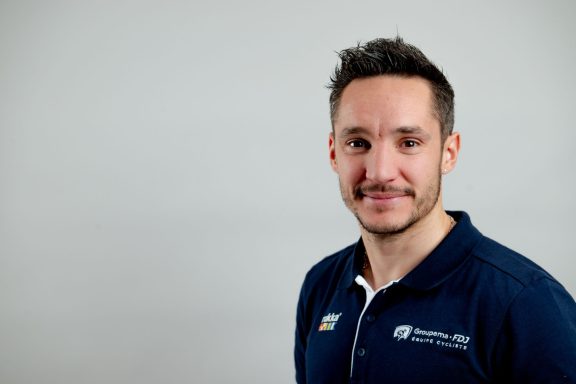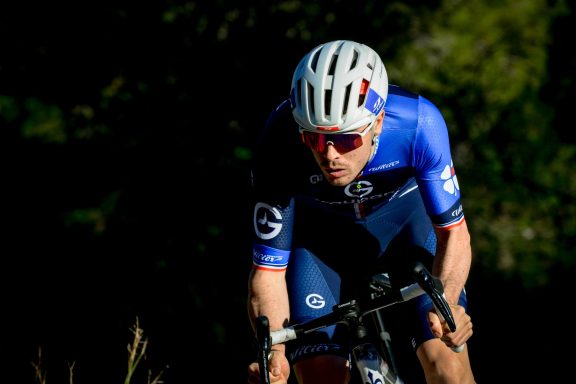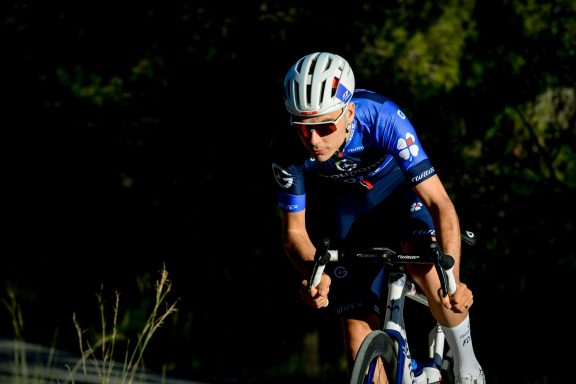As soon as he joined the Groupama-FDJ cycling team, over the 2018-2019 winter, Stefan Küng immediately won unanimous support, thanks to his personality, his athletic abilities but also his professionalism. Driven by a sharp and deep interest in equipment, the former individual pursuit world champion has been able to actively take part in developing some projects in the past months. In this interview, he shares with us the quest for perfection and the attention to detail that constantly guide him.
Stefan, first of all, how do you live the current situation and the season’s provisional break?
I am lucky enough to still be able to train outside because quarantine in Switzerland is not as strict as in France at the moment. I take advantage of it because the weather has been pretty good lately. If the situation happens to worsen, I will get back to my home trainer like my teammates. However, there is a lack of structure in training as there are no longer short-term goals. I have the feeling I am in November, when we resume softly, slowly, when we ride according to the legs or the weather. Right now, we just try to maintain the physical condition. Even if there are no races for several weeks, we will for sure get back to racing, and we cannot afford to do nothing in the meantime. Actually, the difference with November is that the shape is very good, legs respond well. So from time to time, I enjoy myself by making some efforts. I worked really hard all winter to be ready for the Classic season, but I can’t prove it, I can’t show what I’m able to do. It’s a shame, but there’s nothing we can do about it and we’re all in this together.
“The partnership with Lapierre is extraordinary”
You just started your second season with Groupama-FDJ. Can you come back to your arrival in the team?
It was the first time I changed teams in my career. I didn’t really know what to expect, but I quickly fit in and was very warmly welcomed by everyone. We were able to quickly put things into place, especially in terms of equipment. I also had my own struggles, but when it happened, I really felt like the whole team was behind me. Everyone tried to help me solve the problems as quickly as possible. I love the mentality of this team; it’s really family-friendly while maintaining the focus on performance. We’re all on an equal footing and nobody looks down on anybody, which I really appreciate. Everyone can speak their mind and then we work really well together.
Did you have any requirements when you made the decision to join the team?
It was essential for me to join a team that, much like me, gave great importance to equipment development. I quickly understood, when we started to talk, that the partnership with Lapierre was extraordinary. Usually, the brand makes the bike, the team rides with it, and basta (sic). With Groupama-FDJ, we can have an influence on the development of the bikes. Lapierre may not be the most well known brand on the world market, but in terms of performance, they make no compromises. I had good discussions with the engineers and it once again confirmed my initial choice. It is essential for me to know that everything is done to maximize the equipment, with the participation of the whole team, the performance department and partners. They are always keen on improving and developing new things
How do you explain your deep interest in material? Has it always been so?
As a time trial specialist, I rely a lot on a high-performance bike and equipment. Nowadays, the margin is so small between all the teams and riders that you can’t afford to lose a percentage here or there. Everything needs to be set to the millimetre. The equipment has evolved a lot over the last twenty years, so there is a large choice, in terms of tubular tires, tires, tubeless… In my opinion, you need to try everything in order to get the maximum out of each piece. When we find the best set-up, the one that allows us to win a bit over the opponents, there is a real satisfaction. I’m interested and always have been in this area of cycling. Even when I’m at home, I try new things. I test the whole range of wheels we have, with different pressures in the tubular tires. The rider’s feelings obviously come into play but there is also the test data, and these two factors combined have already allowed us to make some improvements. When I test a set-up on the bike, I know very quickly if it works or not. For example, I really felt a difference when I recently got to test the prototypes of the new Aircode and Aeorstorm (time trial). Others wouldn’t have felt it, perhaps. This is only possible if you are interested in it all the time and are precise and rigorous in this area. I find it quite exciting to seek the best set up according to all options we have.
“If you content yourself too quickly, there will always be an untapped margin”
Doesn’t the desire of perfectionism constantly leave you hungry for more?
I try to do my best, but I also know that after a while, you need to understand that we have found a certain set-up, and that it is what it is. As long as I know it’s the best we could come up with, it’s fine for me; in my head it’s all good. If I have the feeling that there is a little something missing, then it is not ok, it disturbs me mentally. It may be a little weak… However, I really believe that there is always a way to put everything in place to get a 10 out of 10. Once I know that everything is perfectly set, it’s up to me to perform. I must admit that I sometimes struggle to settle for certain things. I really have high expectations for myself and it is not always easy to manage. For me, it’s really the victory that matters. When you get the results sheet of a time trial and you’re not the winner, then it’s not perfect. It’s not easy to think that way, but it’s also what keeps me going and pushes me to get the most out of myself, in training and racing. When you want to win, you need this mentality. If you content yourself too quickly, there will always be an untapped margin. My real goal is to take advantage of all my potential. I may not be happy really often, but I’m always very ambitious, and it’s ambition that keeps me going.
Do you try to pass on this demanding nature to others?
When I was still on the track with the pursuit national team, I realized that I could not demand this level of requirement from everyone. I ask for it, obviously, but I also know that each person is different. When I train, alone, I obviously demand the maximum from myself. When you’re gathered as a team, the goal is of course that everyone gives their best, but it is not always possible. You have to understand it. Also, it is not up to me to demand it, it is up to the sport directors, the coaches. I can just lead by example. It’s the best thing to do as a leader. When others see that you give 100% of yourself, I tend to believe that it can also boost them. This is how it works, not by imposing your own psychology on others.
Let’s switch back to equipment. How important is it nowadays in terms of performance?
It plays a large part in many areas. The most obvious one is of course in time trials, because you can really distinguish and measure the differences between helmets, suits and bikes, but it also has a strong impact in other circumstances. For example, in an echelons stage in Paris-Nice, you can quickly feel whether your bike is aerodynamic or not. It’s always small gains, but combined, they make big differences. Nowadays, it is so difficult to increase the level of performance that everyone is looking for the smallest detail. Nothing should therefore be overlooked on the equipment side. It’s up to us to use the best one possible, but everyone also makes their choices. As far as I’m concerned, it is for example out of the question, on a flat stage with risk of echelons, not to put on the “aero” helmet and suit. Even if the gain over three or four hours is only 1%, it is still 1%, and it should not be wasted. It’s also about trust in your equipment. When you know you have the best one, that you have something that others don’t necessarily have yet, or when someone stares at your bike and says “wow, it looks great”, it gives a psychological advantage.
“Testing is training”
How does your collaboration with the team on equipment materialize?
We do a lot of tests. The performance department does some in the first place, then gives us the opportunity to try out the equipment. With the data they already have, they can draw certain trends, then we establish a test protocol together with several set-ups. Last year, for example, before Binche-Chimay-Binche (in October), they asked me if I wanted to test tubular tires and tires in anticipation of Paris-Roubaix 2020. I was obviously up for it, so I went to Belgium a day earlier and we did a day of testing with the set-ups defined in advance. The performance department really tries to make the day as efficient as possible. It’s also up to us to decide if we want to do it, they don’t force us to do it. Of course, they usually ask the leaders because it is up to us to decide what is the best set-up for ourselves… We talk all the time, we make plans for the future. This winter, we wanted to retest the positions on the time trial bikes. So we set a day in December and worked on it all day in Valencia, then we got back to it in early March in Granges. We are constantly working, it never stops since equipment is also constantly evolving. As soon as a new thing is available, we test it. When I’m on my side, I usually do an hour circuit with two different setups. I test the handling, at 60 km/h, in the corners, while accelerating. Then, thanks to a form I am sent, I can give feedback, describe how I felt this or that. In this comparison phase, I try to do a written or audio sum-up immediately, so that I still have the memories and the feelings in mind. It is essential to be able to share the feeling you experienced on the bike or for a certain piece of equipment to the performance department, since they cannot guess it. Describing a feeling is sometimes a difficult exercise, but it comes with experience. The more you do it, the easier it gets.
Doesn’t your involvement in this matter distract you from training?
I have no problem combining both. The coaches also try to include these test days in the training cycle. It doesn’t tire me at all. On the opposite, I really enjoy it. Also, if I happen not to be up for it, if I feel really tired, I just say it and they know that there is no point in pushing it. If you are not motivated for an equipment test, it is not fun at all. For a test on cobbles, for example, you have to ride 20 to 30 times the same sector, going back and forth. For a time trial bike test, I ride the same route twelve times a day. It is certainly not the cycling we all dream of, but it is very interesting, and above all very important. So when you are mentally ready for a day like this, you are also ready to feel each sensation as it should. It’s a time when you have to go into detail, be very focused, and that’s something I personally enjoy doing. Training remains the priority, but at the end of the day, “testing is training”. On a track test day this winter, I did twelve sessions of twelve minutes. In the end, that makes it almost 120 kilometers. Of course there is no specific work, but these are not rest days either. If it is well incorporated in the training cycle, it is not a lost day at all, on the contrary. And then, the equipment must be tested in race pace, so if you ride at race pace in training, it is necessarily good training
Do you have time to test some things in this period of inactivity?
Almost everyone is in lockdown, so we don’t even have the possibility to set up test days. Once the season will resume, we may have to go from races to races, and it will no longer be really possible. That being said, we had done everything before. The last setups were made in early March. If we weren’t ready today, that would mean that we wouldn’t have done our homework during the winter. In reality, we were completely ready for this season, so we will always be when it starts again.



No comment